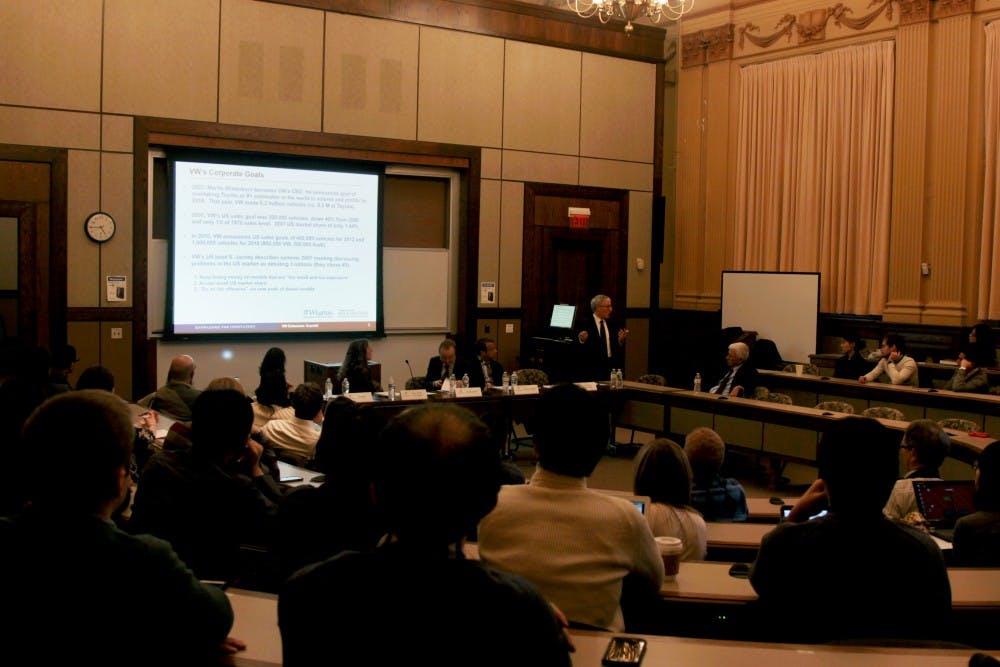
Following Volkswagen's deceitful emission transgression, Penn Law members discuss how and why this scandal happened.
Credit: Tiffany PhamAs the world begins to adopt greener legislation, some corporations have attempted to circumvent regulations and have ended up in hot water, such as Volkswagen, the subject of a panel discussion organized by three Penn Law students.
On Thursday, Penn Law’s Institute of Law and Economics sponsored an event that focused on the Volkswagen Emission Scandal. The three students, Prachi Jhunjhunwala, Lev Gaft and Philipp Scheibenpflug, organized the panel because they were “wondering how it’s possible such a huge scandal has happened,” and how it “snowballed and came out in the open only at this time,” Jhunjhunwala noted.
In September 2015, the Environmental Protection Agency issued an official notice on its findings that Volkswagen cars sold in the United States contained a “defeat device” designed to elude emissions tests. According to the EPA, Volkswagen violated the Clean Air Act between 2009 and 2015, in Volkswagen and Audi diesel cars that were equipped with 2.0 liter engines. The “defeat devices” would lower carbon emissions during tests but would revert back to higher carbon emissions after the tests.
At the panel discussion, Wharton Professor John Paul MacDuffie cited Volkswagen’s “super-ambitious corporate goals” to overtake Toyota as the top global producer of automobiles as Volkswagen’s likely motives for violating the law. MacDuffie explained that diesel was Volkswagen's only way to significantly increase market shares in the United States
Penn Law Professor Jill Fisch noted that “Volkswagen made a strategic decision to launch diesel cars in the U.S.” and that they went down a “slippery slope” to work around the standards.
But this was not the first time that Volkswagen has violated EPA standards.
Professor MacDuffie mentioned that the company was the first automaker to be fined by the EPA in 1973 for eluding emissions controls after the passage of the Clean Air Act of 1970.
Volkswagen was not alone; several other companies ended up violating the law. General Motors in 1995 was fined for installing a chip to turn off pollution controls when the air conditioning turned on. However, as Judge Cheryl Ann Krause noted, “the Justice Department touted General Motor’s cooperation” with investigations.
While the case is being pursued in the United States, Europe has yet to take it up.
“The EU is easier on diesel emissions than the U.S.,” Professor MacDuffie noted, so “they’re admitting it here but not in Europe.” Volkswagen officially admitted fault in September 2015 in the United States but not in Europe.
The panelists also stressed the importance of whistleblowers in the investigation.
“The parallel here is a good way to demonstrate how, with limited resources of agencies, our government has come to depend heavily on whistleblowers,” Krause noted, when comparing the German Volkswagen case to the American General Motors case. “Here in the U.S., we have very significant whistleblower protections and financial incentives,” but “there is nothing close to that protection and financial incentives that had been in place in Germany.”
Associate Professor at Fordham University Martin Gelter, who is European, explained the mindset in Germany. “We don’t need all these Americans coming here saying, ‘You need to do this, you need to do that’. A lot of this is American pressure.”
However, this breach of the law has damaged Volkswagen’s sales and image in the United States and Europe. The fifth panelist, Jason Halper, a graduate from Wharton and a partner at Orrick, Herrington & Sutcliffe LLP observed that “if you lose credibility with regulators, that’s very hard to get back.”
The Daily Pennsylvanian is an independent, student-run newspaper. Please consider making a donation to support the coverage that shapes the University. Your generosity ensures a future of strong journalism at Penn.
DonatePlease note All comments are eligible for publication in The Daily Pennsylvanian.




